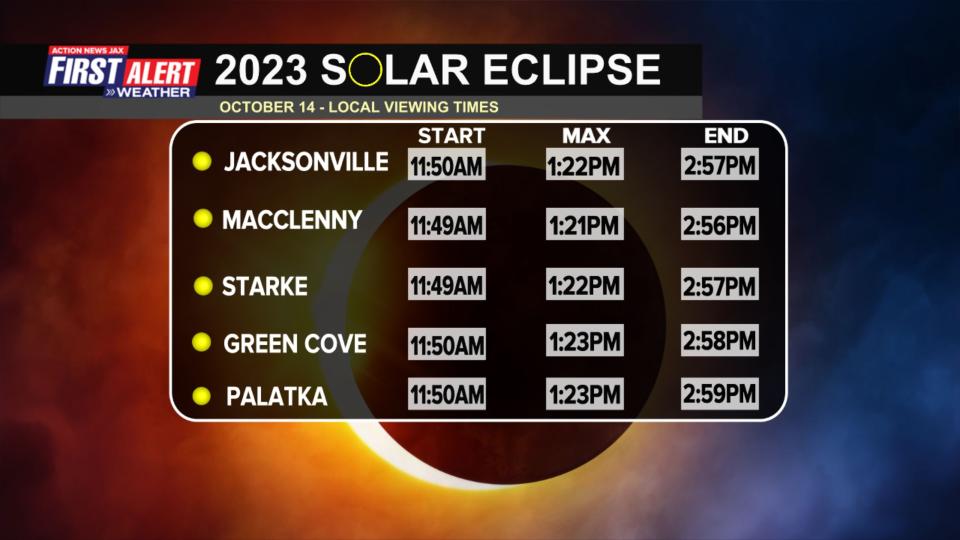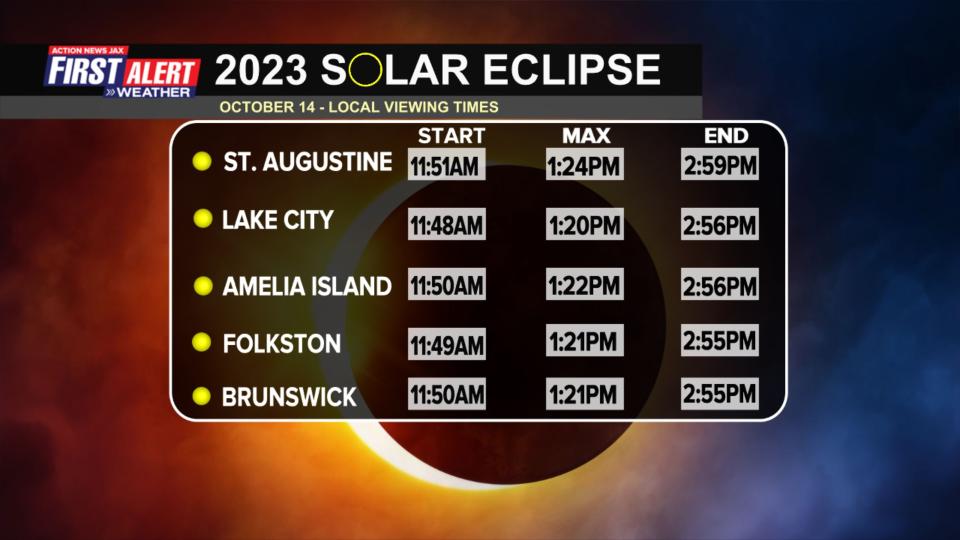Rare annular eclipse happens Saturday: Here’s where, when to view it in the Jacksonville area
>>REMEMBER: NEVER VIEW THE SUN WITHOUT EYE PROTECTION<<
What a year ahead for the United States & solar eclipses. That’s right -- plural. Not just one but two -- Oct. 14, 2023 and April 8, 2024.
Unfortunately – for Jacksonville – only a little more than half of the sun will be eclipsed on Oct. 14. About two-thirds of the sun will be blocked in April.
>>> STREAM ACTION NEWS JAX LIVE <<<
So how exactly does a solar eclipse occur?
It’s when the moon (always during the new moon phase) travels between the earth and the sun, becoming perfectly oriented between the two, thereby blocking out the sun on a very small fraction of the earth or, in other words, the moon casts a shadow on the land below.
Solar eclipses occur somewhere on Earth about every 18 months, but a particular spot on Earth is in the path of totality only about once every 375 years! The typical circumference of the total eclipse on the ground below is only about 100 miles (but can & will vary).
GET READY: Action News Jax First Alert Weather Team’s complete Eclipse coverage
What does ‘annular’ mean?
As for the solar eclipse coming up on Saturday, we have to start with the term “annular” and why it’s different than a true total solar eclipse (which will occur on April 8).
First & foremost, no annular eclipse is truly a total eclipse because the sun still shines around at least the very outer edges of the moon – often referred to as the “ring of fire” as the moon does not completely cover the sun.
The core of this annular eclipse will stretch from the west coast of Oregon southeastward across parts of Nevada, Utah, New Mexico, and Texas.
For Jacksonville, the annular eclipse will begin at 11:50:21 a.m. and end at 2:57:34 p.m. with a maximum at 1:22:38 p.m. when 52% of the sun will be “blocked.”
[DOWNLOAD: Free Action News Jax app for alerts as news breaks]
What are the local viewing times for Saturday’s eclipse?
See the following table and graphics below to find out what the viewing times are for Saturday’s eclipse:
City | Start | Max | End |
|---|---|---|---|
Jacksonville | 11:50 a.m. | 1:22 p.m. | 2:57 p.m. |
Macclenny | 11:49 a.m. | 1:21 p.m. | 2:56 p.m. |
Starke | 11:49 a.m. | 1:22 p.m. | 2:57 p.m. |
Green Cove Springs | 11:50 a.m. | 1:23 p.m. | 2:58 p.m. |
Palatka | 11:50 a.m. | 1:23 p.m. | 2:59 p.m. |
St. Augustine | 11:51 a.m. | 1:24 p.m. | 2:59 p.m. |
Lake City | 11:48 a.m. | 1:20 p.m. | 2:56 p.m. |
Amelia Island | 11:50 a.m. | 1:22 p.m. | 2:56 p.m. |
Folkston | 11:49 a.m. | 1:21 p.m. | 2:55 p.m. |
Brunswick | 11:50 a.m. | 1:21 p.m. | 2:55 p.m. |


The University of North Florida will also be hosting a watch party to watch the solar eclipse on Saturday. CLICK HERE for more information on that.
How do I safely view a solar eclipse?
Again, we remind you to *not* look at the sun without eye protection:
Always inspect your solar filter before use; if scratched, punctured, torn, or otherwise damaged, discard it. Read and follow any instructions printed on or packaged with the filter.
Always supervise children using solar filters.
If you normally wear eyeglasses, keep them on. Put your eclipse glasses on over them, or hold your handheld viewer in front of them.
Stand still and cover your eyes with your eclipse glasses or solar viewer before looking up at the bright sun. After looking at the sun, turn away and remove your filter — do not remove it while looking at the sun.
Do not look at the un-eclipsed, partially eclipsed, or annularly eclipsed Sun through an unfiltered camera, telescope, binoculars, or other optical device.
Similarly, do not look at the Sun through an unfiltered camera, telescope, binoculars, or any other optical device while using your eclipse glasses or handheld solar viewer in front of your eyes — the concentrated solar rays could damage the filter and enter your eyes, causing serious injury.
Seek expert advice from an astronomer before using a solar filter with a camera, telescope, binoculars, or any other optical device; note that solar filters must be attached to the front of any telescope, binoculars, camera lens, or other optics.
[SIGN UP: Action News Jax Daily Headlines Newsletter]
The ‘Great American Eclipse’
Then the countdown will be on to the April solar eclipse! The 2024 solar eclipse will cross a very populated portion of middle America. If you want to travel to totality, you will need to plan your trip early and make your overnight reservations as soon as possible. If you plan to overnight in the path of totality, be prepared to pay a high price! But Chief Meteorologist Mike Buresh said if you do go, you will want to travel to more eclipses in the future -- it is purely magical. You can read about his 2017 total eclipse experience in the Buresh Blog: “My 2017 Solar Eclipse Experience.”
Click here to download the free Action News Jax news and weather apps, click here to download the Action News Jax Now app for your smart TV and click here to stream Action News Jax live.

